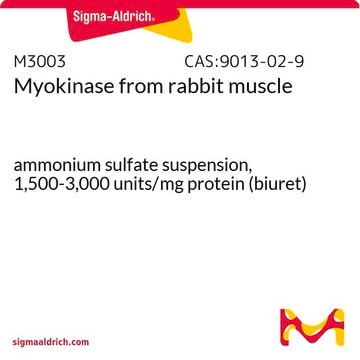10108987001
Roche
Pyrophosphatase, inorganic (PPase)
from yeast
Synonym(s):
inorganic pyrophosphatase
Sign Into View Organizational & Contract Pricing
All Photos(1)
About This Item
Recommended Products
biological source
yeast
Quality Level
form
suspension
specific activity
~200 units/mg protein (At 25 °C with inorganic pyrophosphate as the substrate.)
packaging
pkg of 1 mL (1 mg)
manufacturer/tradename
Roche
storage temp.
2-8°C
General description
Pyrophosphate phosphohydrolase
The enzyme pyrophosphatase is ubiquitously distributed in a number of organisms.
Specificity
Specific activity: Approximately 200 U/mg at +25°C with inorganic pyrophosphate as the substrate.
Application
Inorganic pyrophosphatase has been used in enzyme assays and enzyme inhibition studies.
Pyrophosphatase, inorganic (PPase) has been used in :
- Enzymatic nitric oxide (NO) detection system
- In vitro transcription
- Multiply-primed rolling circle amplification
Biochem/physiol Actions
Inorganic pyrophosphatase catalyzes the hydrolysis of inorganic pyrophosphate to orthophosphate.
Mg ions are necessary for catalytic activity of crystalline pyrophosphatase.
Quality
Contaminants: <0.01% ATPase and phosphatases, each (at pH 7 and 4-nitrophenyl phosphate as the substrate).
Physical form
Suspension in 3.2 M ammonium sulfate solution, pH approximately 6
Other Notes
For life science research only. Not for use in diagnostic procedures.
Storage Class Code
12 - Non Combustible Liquids
WGK
WGK 1
Flash Point(F)
No data available
Flash Point(C)
No data available
Certificates of Analysis (COA)
Search for Certificates of Analysis (COA) by entering the products Lot/Batch Number. Lot and Batch Numbers can be found on a product’s label following the words ‘Lot’ or ‘Batch’.
Already Own This Product?
Find documentation for the products that you have recently purchased in the Document Library.
Customers Also Viewed
Michael A Kron et al.
Protein science : a publication of the Protein Society, 17(6), 983-989 (2008-04-16)
Diagnosis of eukaryotic parasitic infection using antibody-based tests such as ELISAs (enzyme-linked immunosorbent assays) is often problematic because of the need to differentiate between homologous host and pathogen proteins and to ensure that antibodies raised against a peptide will also
Single prokaryotic cell isolation and total transcript amplification protocol for transcriptomic analysis.
Kang Y, et al.
Nature Protocols, 10(7), 974-974 (2015)
Tracking the m7G-cap during translation initiation by crosslinking methods.
Gross L, et al.
Methods, 137, 3-10 (2018)
2'-O-methylation of the mRNA cap protects RNAs from decapping and degradation by DXO.
Picard-Jean F, et al.
PLoS ONE, 13(3), e0193804-e0193804 (2018)
Yakov Y Woldman et al.
Free radical biology & medicine, 47(10), 1339-1345 (2009-09-16)
Nitric oxide (NO) is a free radical involved in many physiological processes including regulation of blood pressure, immune response, and neurotransmission. However, the measurement of extremely low, in some cases subnanomolar, physiological concentrations of nitric oxide presents an analytical challenge.
Our team of scientists has experience in all areas of research including Life Science, Material Science, Chemical Synthesis, Chromatography, Analytical and many others.
Contact Technical Service










